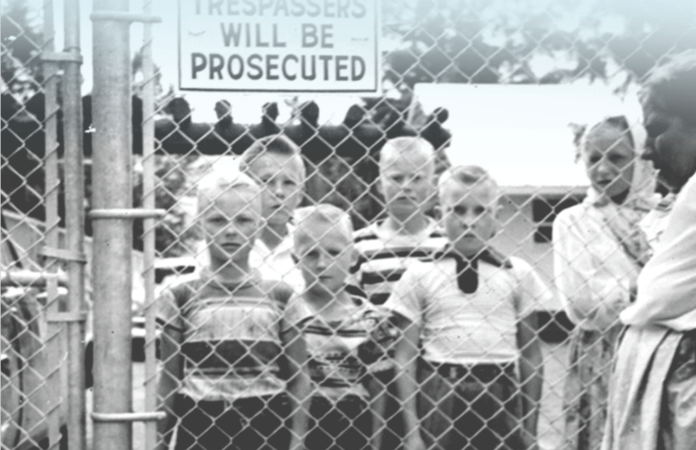BC’s Ombudsperson says he’s heartened to hear the BC government plans to apologize to Sons of Freedom Doukhobor children removed from their families and sent to residential school in the 1950s.
But Jay Chalke adds he’s disappointed details around compensating survivors and their families remain vague.
Last week Chalke issued a follow-up to a report produced in 1999 that called on the government to provide an apology and compensation.
In a letter, Attorney General Niki Sharma replied the forced removal and confinement in New Denver of about 200 children from 1953 to 1959 “continues to have long-lasting, traumatic impacts on survivors and their families” and said government “is prepared to issue an apology this fall.”
“That part of our report is, I think, good news for the community,” Chalke said in an interview. “It’s something many people have called for for many, many years. Finally it’s great to see the government is moving on that.”
He said he expects the government to work with survivors on how, when, and where the apology will take place and craft wording that meets the needs of those who will hear it.
“That’s been the tradition when governments have apologized for other historic wrongdoings, so there’s no real reason why they shouldn’t do it in this case as well.”
In the same letter, Sharma indicated government is “preparing a formal recognition package,” but didn’t elaborate.
Chalke said it’s not clear what might be contained in package and there was no timeline attached. But he believes government should look at compensating individuals, families, and the broader community.
For some the apology and any compensation will come too late. By some estimates about half of the children are still alive, now in their 70s and 80s.
“But for those still alive, I think it’s an important step they’ve waited their whole lives to hear,” Chalke said. “The day has long since come when that should take place.
“Justice sometimes takes a long time to achieve, so while some of their loved ones many no longer be with it us, I think it’s still important that the descendants of those people who were in New Denver hear the attorney general apologize.”
Chalke said it is common after issuing reports for his office to monitor whether public bodies implement their recommendations. An initial follow-up report was completed in 2002.
In 2004, the province offered survivors a “statement of regret,” in the legislature but not an apology.
Chalke explained at the time the government was concerned about exposure to litigation, but since then it has successfully argued that it can’t be sued for actions before 1974. The legislature further passed an Apology Act making apologies inadmissible in civil proceedings, clearing the way for public apologies on several other matters.
However, in 2018, then-attorney general and now-premier David Eby said the government was considering an apology. Chalke said they have also heard from some in the community saying they felt it’s still important for government to take that step.
The matter was also the subject of a Human Rights Tribunal complaint, which was dismissed in 2013.
The original 1999 report found the government maltreated children by alienating them from their parents, religion, culture and language by institutionalizing them and separating them from their families and putting them in a setting that abused them through neglect and lack of love and absence of nurturing and harsh discipline.
Then-Ombudsperson Dulcie McCallum found they suffered irreparable loss and harm and long-term trauma.
“They treated the children as if they were somehow criminals,” Chalke said. “The first-person accounts some of those people shared with us at the time are very hard to read.”
One of those now-grown children says she’s “kind of ambivalent” about an apology.
Elizabeth Hlookoff was taken from her family in Grand Forks in 1954 at age seven and spent four and a half years in New Denver. She recently published a memoir about her experience.
“The old lady me thinks who cares?” she says. “What is it going to do? Is it going to change my life or what’s going to happen? But then when I sort of reconsider I think that little girl inside maybe she needs to hear it. Maybe somehow it will quiet down that ghost.”
Hlookoff notes few if any of the decision-makers are still alive, but governments are still responsible for fixing their errors.
Hlookoff wasn’t part of the initial calls for an apology nor the Human Rights Tribunal case.
“I thought I was done with it all and I didn’t want to revisit it,” she says. “It happened so many years ago, and I’m finished, and I have a life. I don’t want to dwell on it. But it resurfaced, which I didn’t expect.
“Probably when the stories kept popping into my head and I sat down and started writing them down, it was like reliving the whole thing.”
Although she was not associated with the community for many years, more recently Hlookoff has been in contact with a few other survivors and learned what some of them went through. The apology may be far more important to them, she says.
“It’s not, at this point, going to make a hell of a lot of difference to me. It’s kind of late in the day.”
Hlookoff gave a copy of her book to her MLA. A few weeks later he apologized and said he had been too busy to read it.
“Maybe he’ll read it now,” she said.







